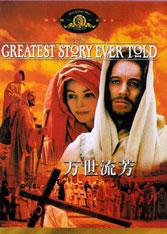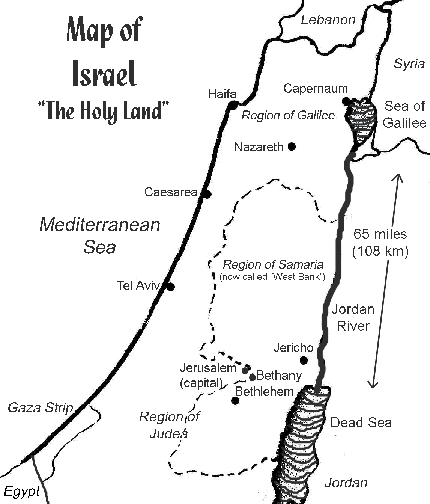A few terms
(vocabulary):
amnesty: an official order by a
government that allows a prisoner to go free
adultery: the crime (according to
the Bible) of having sex between someone who is married and someone who is
not their wife or husband. (In the movie, Jesus tells someone who had been
“caught in the act of adultery” to “Go your way and sin no more.”)
blasphemy: something you say or
do that is insulting to God or people's religious beliefs. (Jesus was
“charged with blasphemy” for saying that he was God’s Son when he used the
holy Name of God to refer to himself, that is by answering “I Am.”)
burden: something difficult or
worrying that you are responsible for
burial: to put a dead person into
a grave. (In the movie, Mary pours expensive perfume on Jesus, and he says
she is “preparing me for my burial;” this showed that he knew that he was
soon going to die before it happened.)
crippled: someone who is unable
to walk properly because their legs are damaged or injured (this term is now
considered offensive, but it wasn’t when the movie was made). In the movie,
Jesus says “walk in the light,” and a crippled man says “I cannot walk; are
you mocking me?”
cross (verbs: to
crucify/crucified): a wooden structure criminals were nailed to as a form of
execution (i.e., used by the Romans to kill prisoners). You will see that
the Romans did this often, and on at least two occasions they did it to
hundreds of rebels—and lined the road with the dying bodies. It could take
from a few hours to a few days to die, depending on how much they torture
you before crucifixion.
disciple: a student who traveled
with his teacher in order to learn what he taught and how he lived, with the
goal of someday passing on to others “all that the teacher did and said”
gold, frankincense, myrrh: three
expensive gifts that were given to Jesus when he was a baby (frank-incense
was burned to make a king’s home smell good; myrrh was especially used when
a king died)
heresy: a belief that disagrees
with the official principles of a particular religion
homage: see worship
imposter: someone who pretends to
be someone else in order to trick people
miracle: an action or event
caused by God, which is impossible according to the ordinary laws of nature.
(The Bible teaches that miracles can happen when people put their faith in
God into action.)
mourners: people who are
expressing sadness after a loved one dies
pilgrims: a religious person who
travels a long way to a holy place (such as those who make the annual trip
to Jerusalem for the Passover festival)
pious: showing strong religious
belief through the way you live (opposite: impiety)
prophesy: see “people” prophet
sacrifice: when you decide not to
have something valuable, in order to get something that is more important;
in a religious context, a “perfect” animal was killed to “pay” for the
giver’s sin, thus showing God that you understand how valuable forgiveness
is. One important quote is, “God desires love not sacrifice” (that is, as
important as sacrifice is, loving God and loving your neighbor is an even
better way to show that you are pious)
sedition: speech, writing, or
actions intended to encourage people to disobey a government
sin: according to the Bible, sin
is every human act that falls short of the perfection God intended for
humans; all sin separates people from God, and the only way to “pay” for sin
was through blood sacrifice
sorcery: magic that uses the
power of evil forces (contrasted with “miracles”)
superstitions: practices based on
the belief that some objects or actions are lucky, are unlucky, or cause
events to happen (this is different from “religious practices” based on a
belief that some actions are right or wrong according to God or religious
teachings)
treason/treasonous: the crime of
being disloyal to your country or its government, especially by trying to
replace the government. (When Rome heard people tell Jesus “You are our
king” they considered it treason.)
worship: something you do to show
love and respect for God; formal (old): to do homage
A few verbs
(more vocabulary):
to baptize: to put people in
water (or pour water on them) after they promise to turn away from sin. (A
person who does this religious ceremony is called a baptist.)
to crucify/crucified: see cross
to fast: to eat nothing for between several hours to 40 days,
esp. to show or build religious faith or before a medical procedure (“I’m
fasting”)
to flee: to run away
to repent: to turn from sin
(often spoken as a command “Repent!”)
to save (salvation): to rescue
someone or make someone safe from danger, harm, or destruction (salvation
means to be saved)
to tempt: to try to get someone
to want or to do something, even though they know they really should not
People and proper nouns:
Andrew, Peter, John, James:
Jesus’ four closest disciples
Augustus Caesar: The Roman leader
in charge of a vast empire at the time of Jesus’ birth
Governor Pilate: The Roman
governor who ruled in Jerusalem, and who ordered Jesus to be executed by
being put on the cross (for the crime of treason)
(the) grand Sanhedrin: the
highest court in the Jewish religion of the first century; a part of the
Sanhedrin convicted Jesus of blasphemy and sought to have him executed by
the Roman governor
Lazarus, Mary, Martha: a family
who lived in Bethany; they had a particularly close relationship with Jesus
Jesus has many titles, including
“The Word,” the Nazareen, Master, Messiah (see below), Christ, etc.
Judas Iscariot (Judas betrayed
him for money, according to the scriptures; a writing that dates back to the
3rd century claims that Judas was Jesus closest friend and makes him a more
likable character—this movie tries to make us pity Judas)
King David: Israel’s first and
greatest king (about 1000 BC); prophets had said that one day a descendent
(“David’s son”) would be the Messiah, who would rule forever
King Herod the Great: King of
Israel when Jesus was born. He was a particularly cruel man who killed some
of his own sons to keep them from taking his kingship. When Herod died, Rome
divided his kingdom into four parts (each called a tetrarchy) and one was
ruled by Herod’s son Herod Antipas (who was the ruler of Galilee when Jesus
was killed)
Lord Caiaphas/ the High Priest:
the highest Jewish leader, who didn’t believe Jesus was the Messiah and thus
pressured Governor Pilate to execute Jesus on the cross
(continued in other column)

 people
to a cross). The movie starts by showing us that it is also a time of crime
and poverty. Israel’s religious community has two major parts. The religious
leaders have been forced to cooperate with Rome, and thus cannot really obey
the Bible, although they do practice the traditional sacrifices and
Temple-based worship that the Bible commands. Many common people are deeply
religious, and are praying for “the Deliverer” whom God promised to send
someday (see below).
people
to a cross). The movie starts by showing us that it is also a time of crime
and poverty. Israel’s religious community has two major parts. The religious
leaders have been forced to cooperate with Rome, and thus cannot really obey
the Bible, although they do practice the traditional sacrifices and
Temple-based worship that the Bible commands. Many common people are deeply
religious, and are praying for “the Deliverer” whom God promised to send
someday (see below).